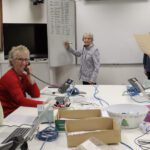Two teams of first-year engineering students from Curtin University of Technology have won awards at a prestigious national engineering competition.
They received their awards at the annual Engineers Without Borders Challenge in Melbourne last week.
One project — Communal Anchored Storm Protection Attachments for Houses — designed by Curtin students Phillip Lawrence, Megan Depiazzi, Giang Nguyen, Kadn Dennis, Gerard Litynski and Carl Davis won an Outstanding Achievement Award.
The Integrated Bamboo Catchment and Filtration System project designed by Curtin students Needra Wickramaratna, Debbie To, Samuel King, Chris Barratt and Paul Gresser won the BHP Billiton Award for Sustainable Design and Appropriate Technology.
This year’s Challenge required students to find an engineering solution to support the development of communities living along the Tonle Sap Lake in Cambodia.
Curtin engineering student Carl Davis, 18, of Seville Grove, said the Challenge exposed participants to a different side of engineering beyond the classroom.
“The competition emphasised the fact that your work can have a direct impact on people,” he said.
“For example, our goal was to provide housing security for 12 families for less than $6 per year.”
Paul Gresser, 27, of Nedlands, said that he enjoyed participating in the Challenge because his team’s project focused on developing an economical and sustainable solution to the problem of accessing clean water for the people of Tonle Sap.
“Since the Challenge involved a real world problem, we were forced to come up with real world solutions,” he said.
“Part of this was accepting the fact that there are no perfect solutions, only better ones.”
Both Curtin teams were approached by development experts from Thailand.
“To be approached by someone who works on these sorts of projects on a daily basis, and to be told that what you have designed had merit was the greatest compliment of all,” Mr Gresser said.
“It confirms that we were able to find a real solution to a real problem that may actually improve peoples’ lives.”
EWB works in partnership with developing communities within Australia and overseas, assisting them to gain access to the skills, resources and equipment they need to improve their standard of living.


